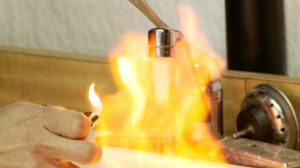>> Four years ago, I didn’t know what the word “frack” meant. It sounded like slang to replace the F-word in conversation. I was right, in a way; once I understood more about the word, I realized that “frack” causes just as much offense as the other F-word.
Four years ago, I didn’t know what the word “frack” meant. It sounded like slang to replace the F-word in conversation. I was right, in a way; once I understood more about the word, I realized that “frack” causes just as much offense as the other F-word.
Fracking means hydraulic fracturing. It’s the process of injecting toxic liquid into the ground in order to extract natural gas. Yes – I said toxic. We’re talking about the neurotoxin mercury and the carcinogens arsenic, benzene, and formaldehyde, to name a few.
>>Fracking could soon come to a neighborhood near you— especially if you live near the Dan River or in Graham County. Last week, Governor Pat McCrory signed the Energy Modernization Act, which—contrary to its progressive-sounding name—will allow North Carolina to issue fracking permits beginning in spring 2015.
This “Modernization” Act comes after our state >>lawmakers promised back in 2012 to put protections in place before allowing fracking. Instead, with this recent legislation, our lawmakers removed the 12 month legislative review from the process and added language that prevents local municipalities from passing regulations that would protect them against fracking.
Fracking alarms me enough on the surface (forgive the pun), but the geology of North Carolina puts us at particular risk. State reports indicate that >>the distance between shale gas reserves and our drinking water is less than half a mile in depth in some places. Compare that to other parts of the country like Pennsylvania, where two miles separate the toxic liquid shale gas from our precious ground water. Ground water supplies 42% of drinking water for North Carolinians.
In addition to contaminating our drinking water, the process of fracking can hurt our health in other ways. A study by the National Institute of Health examined babies born from 1996 to 2009 in Colorado near fracking sites. Researchers found that >>women living in the area during this time were 30% more likely to have babies with congenital heart defects.
Meanwhile, researchers at the Colorado School of Public Health collected air samples in Garfield County, Colorado, the site of several drilling operations, and found that those who lived within a half a mile of the drilling had a higher risk of health issues, particularly an increased >>cancer risk from exposure to benzene.
>>The people employed by the gas companies are also at risk. Workers involved in hydraulic fracturing may be exposed to dust with high levels of silica (up to 99%), which can cause silicosis. That’s a lung disease that causes inflammation and scarring in the lungs, reducing the lungs’ ability to take in oxygen. Silica can also cause lung cancer, tuberculosis, chronic obstructive pulmonary disease, and kidney and autoimmune disease.
Have I scared you yet? What can we do? All I know to do is climb on our rooftops and call foul. Call our lawmakers. Call the federal government. Talk to land owners and discourage them from leasing their land to these gas companies. Because one thing is for sure: once we start injecting poisonous chemicals within inches of our drinking water, there’s no going back.
There are no comments
Add yours